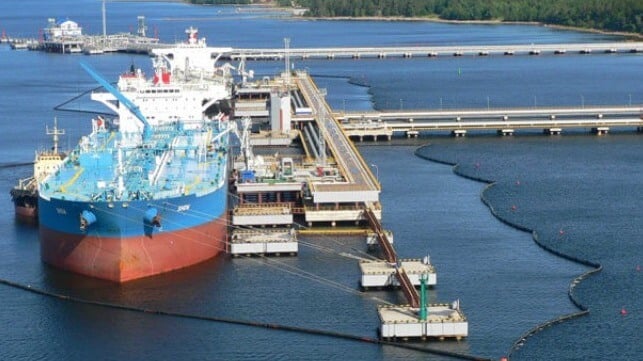Russian Oil Exports Slow as Tanker Market Sorts Out Sanctions Impact

Russia's seaborne oil exports appear to be taking a hit as the tanker market sorts out the implications of new EU and G-7 sanctions.
According to Russian news outlet Kommersant, total Russian oil exports (including pipeline shipments) fell by 11 percent in the period from December 1-20. Seaborne oil shipments appear to have plummeted further. In the first week after sanctions were implemented, tanker exports fell by more than 50 percent, according to calculations by Bloomberg. Shipment volumes to Europe evaporated, and volumes to buyers in Asia also declined for the first time in weeks.
Part of the problem for Russia is a shortage of tanker owners willing to lift its crude, Bloomberg reports. Russian oil comes with a stigma, and several Western supermajors have signaled that they will avoid chartering vessels which have previously carried it. ExxonMobil
In particular, Russia's Eastern Siberia-Pacific Ocean (ESPO) grade faces a challenge because it is too valuable. It sells for more than the $60 limit of the G-7 price cap mechanism, which means that sanctions apply. This is a no-go for many shipowners, and loadings at the Russian Far East port of Kosmino have fallen accordingly. Bloomberg estimates that loadings were down by half at Kosmino in the 10 days after the cap was initiated, and tanker giant Cosco has reportedly withdrawn from the trade lane. Smaller independent shipowners, like those behind the so-called "dark fleet" of experienced sanctions-busting vessels, will have an opportunity to step into a profitable niche.
In the Baltic, Russia's exports of lower-priced Urals crude could be hit hard, according to Reuters. The loading ports for these cargoes are ideally positioned for deliveries to Europe, but that market is now closed, and potential new buyers in Asia are located thousands of miles away.
India, China and Turkey are still buying Urals at rock-bottom prices - sometimes below breakeven - but Russia has struggled to secure tanker tonnage for Baltic loadings in order to make the deliveries. These challenges will likely cut Urals exports by about 20 percent for the month of December, according to Reuters.
